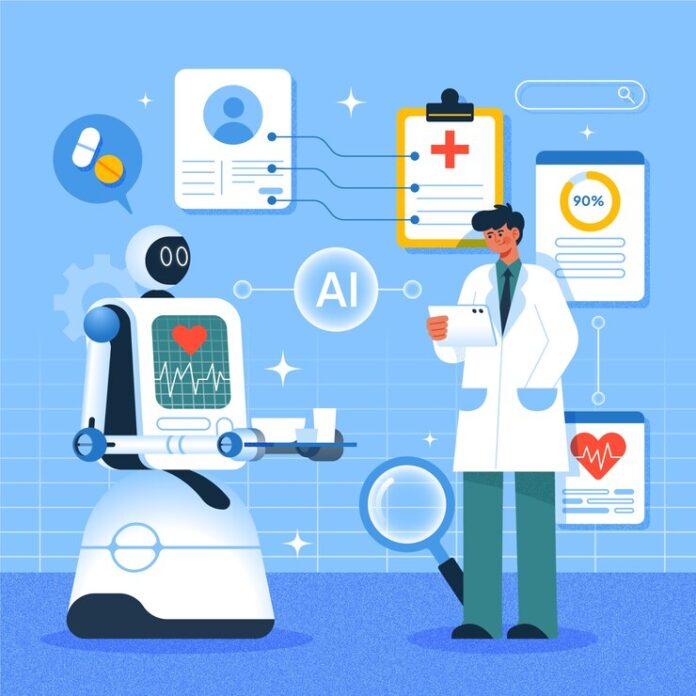In today’s fast-paced world, the integration of artificial intelligence (AI) and technology into healthcare is nothing short of revolutionary. This transformation is reshaping how we perceive and manage health, offering unprecedented opportunities to improve patient outcomes, reduce costs, and enhance the efficiency of healthcare delivery. For healthcare professionals, policymakers, and patients alike, understanding the role of AI in health is crucial to navigating the future landscape of medical care. In this post, we’ll explore how AI and technology intersect with healthcare, their benefits and challenges, recent innovations, and what the future holds.
The New Age of Healthcare
The fusion of AI and technology in healthcare has unlocked new possibilities. From AI-driven diagnostics to personalized treatment plans, the potential to transform patient care is immense. AI’s ability to process vast amounts of data quickly and accurately allows for earlier detection of diseases and improved decision-making. However, it’s not without its challenges. Privacy concerns and ethical dilemmas must be addressed to ensure technology serves humanity responsibly.
Understanding the Current Landscape
AI in Diagnostics
AI is revolutionizing diagnostics by enabling quicker and more accurate identification of diseases. Algorithms can analyze medical images, such as X-rays and MRIs, to detect abnormalities with precision. This capability reduces human error and allows doctors to make informed decisions faster, ultimately saving lives.
Streamlining Administrative Tasks
In addition to diagnostics, AI is streamlining administrative tasks. Automated systems can handle scheduling, billing, and patient record management, freeing up healthcare professionals to focus on patient care. This efficiency reduces costs and minimizes the risk of errors in administrative processes.
Remote Patient Monitoring
Remote patient monitoring is another area where AI and technology shine. Wearable devices and health apps collect data in real-time, allowing doctors to monitor patients’ conditions outside the clinical setting. This continuous data stream improves chronic disease management and helps prevent hospital readmissions.
Benefits and Challenges

Enhanced Patient Outcomes
AI and technology improve patient outcomes by supporting personalized medicine. By analyzing genetic information and lifestyle factors, AI can tailor treatment plans to individual patients, increasing treatment effectiveness and reducing side effects.
Cost Reduction
The adoption of AI in healthcare leads to significant cost reductions. Automation of routine tasks reduces labor costs, while early disease detection and prevention minimize expensive treatments and hospitalizations. This financial relief benefits both healthcare providers and patients.
Ethical Considerations
Despite the advantages, ethical considerations loom large. The use of AI in healthcare raises questions about data privacy and patient consent. Ensuring that patient data is secure and used appropriately requires rigorous policies and transparency to build trust.
Key Innovations
AI-Powered Drug Discovery
AI is accelerating drug discovery by analyzing vast datasets to identify potential compounds and predict their efficacy. This innovation shortens the research timeline and reduces the cost of bringing new drugs to market, benefiting both pharmaceutical companies and patients.
Robotic Surgery
Robotic surgery is another groundbreaking innovation. Surgeons use robotic systems to perform minimally invasive procedures with enhanced precision. These robots reduce recovery times and surgical complications, improving patient experiences and outcomes.
Chatbots and Virtual Health Assistants
Chatbots and virtual health assistants are transforming patient interactions. These AI-driven tools provide round-the-clock support, answer common queries, and assist with appointment scheduling. They enhance accessibility and convenience for patients.
Future Outlook
Predictive Analytics
Predictive analytics will play a pivotal role in the future of healthcare. By analyzing historical data, AI can predict disease outbreaks, patient deterioration, and treatment responses. This foresight allows healthcare systems to allocate resources effectively and improve preparedness.
Integration with Wearable Technology
The integration of AI with wearable technology will continue to evolve. Wearables will monitor vital signs, detect anomalies, and alert users and healthcare providers in real-time. This proactive approach empowers individuals to take control of their health.
Advancements in Telemedicine
Telemedicine’s growth shows no signs of slowing down. AI will enhance virtual consultations by providing real-time insights and recommendations to healthcare professionals. This development will increase access to quality healthcare, particularly in remote or underserved areas.
Conclusion
The convergence of AI and technology with healthcare holds immense promise for the future. By leveraging AI’s capabilities, healthcare systems can achieve greater efficiency, accuracy, and accessibility. However, addressing ethical concerns and ensuring data security are paramount to realizing these benefits. As AI continues to evolve, stakeholders must collaborate to harness its potential responsibly.
